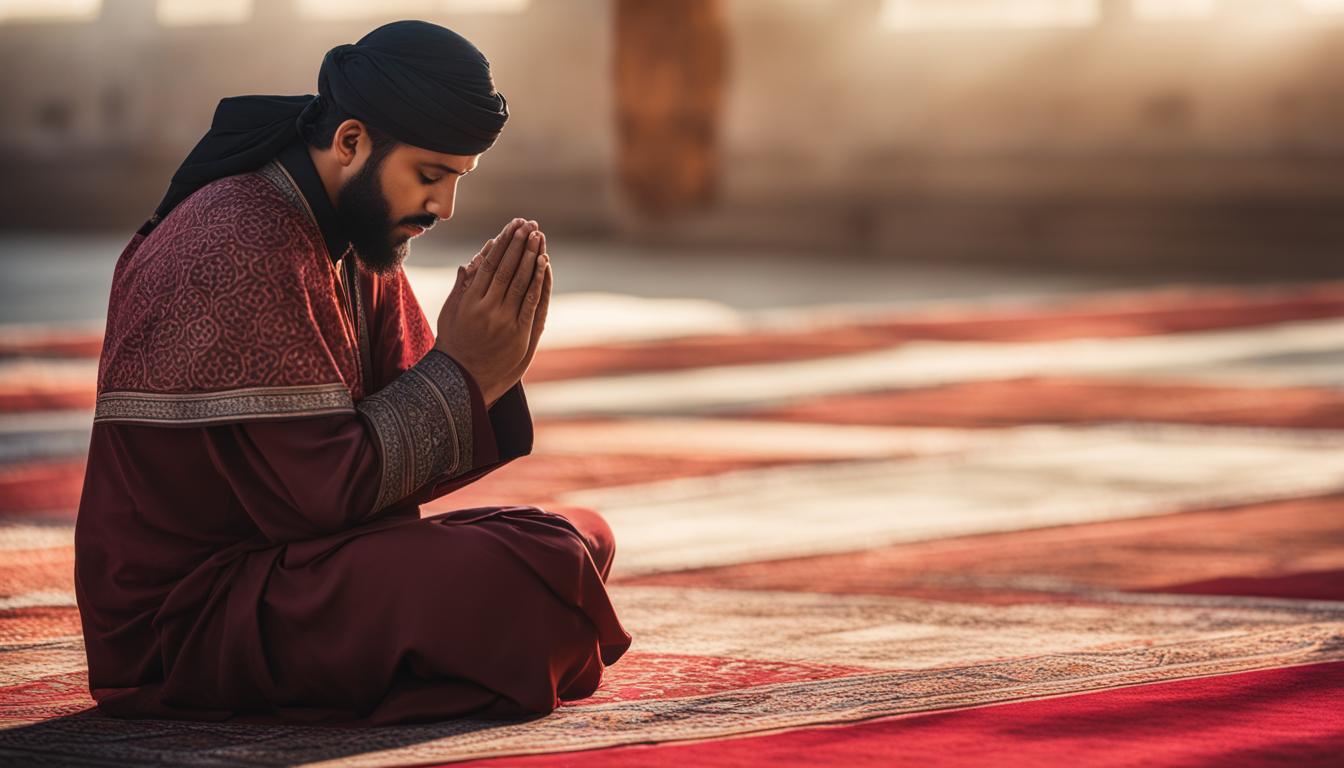Have you ever wondered why Muslims pray? In this article, we will delve into the significance of Muslim prayer and uncover the motivations behind this important religious practice. Prayer holds a central place in the lives of Muslims, offering them solace, guidance, and a deeper connection with their faith.
Key Takeaways:
- Muslims pray as an obligation derived from the teachings of the Holy Quran and the traditions of Prophet Muhammad.
- Prayer serves as a means of establishing a direct connection with Allah and fulfilling the duty of believers.
- Salah, the term for Muslim prayer, is seen not only as a religious obligation but also as a spiritual practice for purification, forgiveness, and guidance.
- Daily prayer brings discipline, structure, and a sense of community to the lives of Muslims.
- Personal experiences and the immediate benefits felt during prayer contribute to Muslims’ motivation to pray regularly.
The Obligatory Nature of Muslim Prayer
Prayer holds a central place in the Islamic faith, with Muslims being obligated to pray five times a day. Known as salah, these prayers are performed at specific times throughout the day, following the teachings of the Holy Quran and the traditions of Prophet Muhammad. The purpose of salah in Islam goes beyond mere ritual; it is a means of establishing a direct connection with Allah and fulfilling one’s duty as a believer.
Salah is considered a fundamental obligation for Muslims, emphasizing the importance of their faith and the presence of Allah in their daily lives. It serves as a constant reminder of their spirituality and helps maintain a sense of discipline and structure throughout the day. Muslims view salah as a sacred act of worship that allows them to express their devotion and seek spiritual purification, forgiveness, and guidance.
By adhering to the obligatory prayer in the Muslim faith, believers establish a routine of worship that brings numerous benefits. Salah fosters a sense of community as Muslims often gather in mosques or in congregation to pray together. It also brings blessings and spiritual rewards, providing solace and peace during times of difficulty. Through daily prayer, Muslims experience a profound connection with Allah, finding comfort, tranquility, and a deeper sense of purpose in their lives.
The Importance of Salah in Muslim Culture
Prayer is deeply ingrained in the fabric of Muslim culture, playing an integral role in the lives of individuals and the wider community. It is a unifying force that brings Muslims together, fostering a sense of brotherhood and sisterhood. Daily prayer serves as a constant reminder of their shared faith and the values they hold dear.
Furthermore, the obligatory nature of prayer in Islam serves as a cornerstone for personal growth and spiritual development. It encourages Muslims to prioritize their relationship with Allah and seek His guidance in all aspects of life. Through salah, Muslims not only fulfill their religious obligations but also embark on a journey of self-discovery, seeking enlightenment and inner peace.
Overall, the obligatory nature of Muslim prayer highlights its significance in the lives of believers. It is a deeply rooted practice that encompasses duty, spirituality, and personal growth. By engaging in daily prayer, Muslims establish a profound connection with Allah, find solace in His presence, and strive towards a life of righteousness and inner peace.
The Spiritual Significance of Salah
Muslims view salah not only as a religious obligation but also as a spiritual practice that brings them closer to Allah. Through prayer, Muslims seek spiritual purification, forgiveness, and guidance. Salah is seen as a means of cultivating mindfulness, self-discipline, and gratitude towards Allah. It is also a form of worship that allows Muslims to express their faith and devotion.
Prayer holds a special place in Muslim tradition as it serves as a direct line of communication between a believer and their Creator. It is a time of focus and reflection, where Muslims detach themselves from worldly distractions and connect with the divine. By engaging in salah, Muslims reaffirm their commitment to Islam and strengthen their connection with Allah.
The Role of Prayer in Muslim Tradition
Salah plays a vital role in the daily lives of Muslims, guiding them in their spiritual journey. It serves as a reminder of their purpose in life and the importance of their relationship with Allah. Prayer provides believers with a sense of peace and tranquility, as they find solace in surrendering their worries and seeking guidance through salah. It is a moment of introspection, allowing Muslims to reflect on their actions, seek forgiveness, and strive for self-improvement.
Moreover, prayer is not limited to the individual but also fosters a sense of community. Muslims often gather in mosques or in congregation to perform salah together. This communal aspect of prayer strengthens the bonds between believers and reinforces their shared values and beliefs. It creates a sense of unity and belonging, reminding Muslims that they are part of a larger ummah, or community, connected by their faith.
The Benefits of Daily Prayer in Islam
Prayer holds immense importance in the daily lives of Muslims, offering a wide range of benefits that contribute to their overall well-being and spiritual growth. Daily prayer, known as salah, serves as a constant reminder of their faith and the presence of Allah in their lives. It helps Muslims maintain a sense of discipline and structure throughout their day, providing a framework that promotes focus and productivity.
Furthermore, prayer fosters a sense of community among Muslims. Many Muslims gather in mosques or in congregation to pray together, creating a shared experience that strengthens social bonds, promotes unity, and encourages support within the Muslim community.
Prayer also brings blessings and spiritual rewards to Muslims. It provides solace and peace during times of difficulty, offering a source of comfort and guidance. By connecting with Allah through prayer, Muslims seek forgiveness, seek spiritual purification, and seek answers to their problems. This connection brings a sense of tranquility and contentment, helping Muslims overcome challenges with renewed strength and clarity.
In summary, the importance of salah in Muslim culture goes beyond its religious obligations. Daily prayer offers numerous benefits, including discipline, community, blessings, and spiritual rewards. It serves as a powerful tool for personal growth, providing Muslims with a sense of peace, solace, and guidance in their lives.
Motivations and Personal Experiences of Prayer
Prayer holds a deep personal significance for Muslims, driven by a variety of motivations. While duty and ritual play a central role in Muslim prayer, there are also profound personal experiences that contribute to the motivation to pray regularly. Muslims find solace, peace, and tranquility in their prayers, which brings them closer to God and provides a sense of emotional well-being.
When Muslims engage in prayer, they experience a profound sense of connection with the divine. It is a time for reflection, self-reflection, and seeking forgiveness. The act of prayer allows Muslims to express their faith and devotion, and it serves as a source of comfort, relief, and guidance in their lives. Many Muslims describe feeling a weight lifted off their shoulders and a sense of clarity after engaging in prayer.
Furthermore, the immediate benefits they feel after prayer contribute to their motivation. Muslims often describe feeling a renewed sense of energy, focus, and optimism after praying. The act of prayer brings a sense of purpose and direction to their day, providing them with a spiritual foundation from which to navigate life’s challenges.
Meaning behind Muslim Daily Prayer
For Muslims, daily prayer is not simply a religious obligation; it carries deep meaning and significance. It is an opportunity to connect with Allah, seek His guidance, and experience a sense of inner peace. Prayer allows Muslims to cultivate mindfulness, self-discipline, and gratitude, fostering a deeper understanding of their faith and fostering spiritual growth.
The act of prayer is an expression of devotion and commitment to Allah, reinforcing the faith and its teachings. Muslims believe that prayer strengthens their relationship with the divine and acts as a reminder of their purpose in life. Through prayer, Muslims find meaning, purpose, and a sense of belonging in the larger Muslim community.
In summary, the motivations for Muslim prayer are multi-faceted, encompassing duty, spirituality, personal experiences, and a desire for spiritual growth. Prayer provides Muslims with a means to connect with Allah, seek His blessings, and find solace and guidance in their lives. The personal benefits experienced through prayer further contribute to their motivation to engage in this spiritual practice regularly, deepening their faith and enriching their overall well-being.

Conclusion
After exploring the various aspects of Muslim prayer, it becomes clear that prayer holds deep significance in the lives of Muslims. It is not simply a religious obligation, but a practice that encompasses spirituality, personal experiences, and intellectual understanding.
For Muslims, prayer is a means of seeking solace, comfort, and guidance. It allows them to connect with Allah on a personal level, finding peace and tranquility in the act of prayer. Through prayer, Muslims also cultivate self-discipline, mindfulness, and gratitude towards Allah.
Furthermore, daily prayer in Islam offers numerous benefits. It provides a constant reminder of faith and the presence of Allah in one’s life. It fosters a sense of community as Muslims often gather in mosques or in congregation to pray together. Moreover, prayer is believed to bring blessings and spiritual rewards, offering solace and strength during difficult times.
In conclusion, Muslim prayer is a practice that encompasses both the duty of religious obligation and the personal quest for spiritual growth. It serves as a sacred connection between Muslims and Allah, providing comfort, guidance, and a sense of belonging. With its rich traditions and profound meaning, prayer is an integral part of the Muslim faith.
FAQ
Why do Muslims pray?
Muslims believe that prayer provides comfort, peace, and answers to their problems. It serves as a way to establish a direct connection with Allah and fulfill their duty as believers. Prayer also brings spiritual purification, forgiveness, and guidance.
How often do Muslims pray?
Muslims are required to pray five times a day. These prayers, known as salah, occur at specific times throughout the day. It is an integral part of the Islamic faith.
What are the benefits of daily prayer in Islam?
Daily prayer in Islam serves as a constant reminder of faith and the presence of Allah. It helps maintain discipline and structure throughout the day, fosters a sense of community, and brings blessings and spiritual rewards. Prayer also offers solace and peace in times of difficulty.
What motivates Muslims to pray?
Muslims are motivated to pray by their sense of duty, spirituality, personal experiences, and intellectual understanding. They find solace, relief, and tranquility in prayer, feeling closer to God and experiencing a sense of peace.
Is Islamic prayer based on intellectual inquiry?
Yes, Islam encourages its followers to question and seek knowledge. Islamic teachings are easily understandable and do not present obstacles or claims that overwhelm the intellect. Islam invites individuals to explore and examine its religious texts and teachings in a critical and intellectual manner.
What is the significance of prayer in Islam?
Prayer holds significant importance in Islam as it serves as a means of connecting with Allah, seeking blessings, and finding solace, comfort, and guidance. It is not only a religious obligation but also a deeply personal and meaningful practice for Muslims, contributing to their overall well-being and spiritual growth.

